最新仁爱版英语九年级上册Unit 3 Topic 1 整个话题 四个部分公开课课件完整版
仁爱版英语九上Unit3Topic1
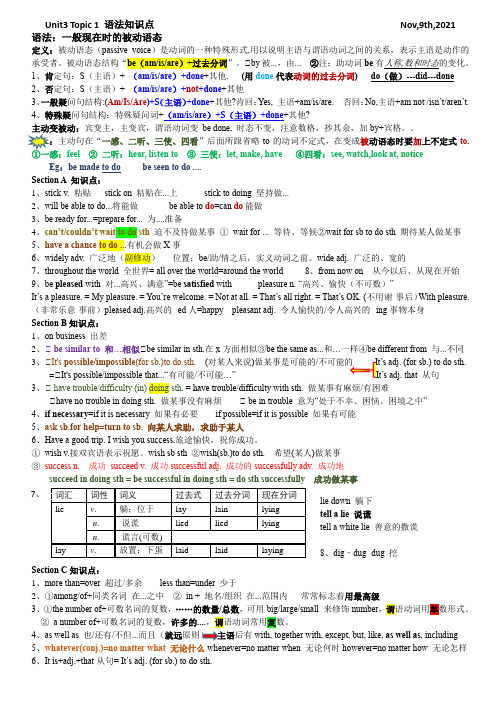
语法:一般现在时的被动语态定义:被动语态(passive voice )是动词的一种特殊形式,用以说明主语与谓语动词之间的关系,表示主语是动作的承受者。
被动语态结构“be (am/is/are )+过去分词”。
①by 被...,由... ②注:助动词be 有人称,数和时态的变化。
1、肯定句:S (主语)+ (am/is/are )+done +其他. (用done 代表动词的过去分词) do (做)---did ---done2、否定句:S (主语)+ (am/is/are )+not +done +其他3、一般疑问句结构:(Am/Is/Are )+S (主语)+done +其他?肯回:Yes, 主语+am/is/are. 否回:No,主语+am not /isn’t/aren’t.4、特殊疑问句结构:特殊疑问词+(am/is/are )+S (主语)+done +其他?主动变被动:宾变主,主变宾,谓语动词变 be done, 时态不变,注意数格,抄其余,加by+宾格。
主动句在“一感、二听、三使、四看”后面所跟省略to 的动词不定式,在变成被动语态时要加上不定式to .feel ② 二听:hear, listen to ③ 三使:let, make, have ④四看:see, watch,look at, noticeEg :be made to do be seen to do ....Section A 知识点:1、stick v. 粘贴 stick on 粘贴在...上 stick to doing 坚持做...2、will be able to do...将能做 be able to do =can do 能做3、be ready for...=prepare for... 为....准备4、can’t/couldn’t wait to do sth 迫不及待做某事 ① wait for ... 等待、等候②wait for sb to do sth 期待某人做某事5、have a chance to do ...有机会做X 事6、widely adv. 广泛地(副修动) 位置:be/助/情之后,实义动词之前。
Unit+1+Topic+3+Section+A+课件+2023-2024学年仁爱版英语九年级上册

1c. Work in pairs and describe New York to your partner based on 1b.You may start like this :
• A: How much do you know about the traffic in New York ? • B: I heard that the traffic there was terrible . Do you have any ideas
In the past Nowadays
√ terrible traffic √ dirty streets unfriendly people √ dangerous to live less shopping centers
√ beautiful parks clean and fresh air huge markets √ famous museums √ good schools √ excellent restaurants
about the streets there ? • A: …
2. Listen to the passage and fill in the blanks with the correct forms of the given words or phrases .
theater used to improve wonderful as a matter of fact since
Language points
1. How do you like (doing) sth.?=What do you think of ...? 你认为……怎么样 e.g. 1). How do you like the weather in Beijing? =What do you think of the weather in Beijing? 你认为北京的天气怎么样?
初中英语 仁爱版九年级上册Unit3 Topic1知识点

Unit3 Topic1Section A1.You can stick it on the wall.你可以把它粘在墙上。
(1)stick(动词)粘贴,粘住Eg:Please stick this map of China on the wall.请把这张中国地图粘在墙上。
(2)stick(名词)木棒,木棍,枝条walking stick拐杖(3)stick to sth.坚持,坚守(某种观点、主张、理想、真理、协议)Eg:He always sticks to his own decision.他总是坚持他自己的决定。
(4)stick to doing sth.坚持做某事Eg:He sticks to speaking English every day.他坚持每天说英语。
2.Guess what!猜猜看!3.character人物,字体,性格特征4.Disneyland is enjoyed by millions of people from all over the world.世界上数百万的人都喜欢迪士尼乐园。
(1)is enjoyed被喜欢,是一般现在时的被动语态结构。
(2)by被(由)...,放在句子的后面,特别强调动作或行为的执行者。
5.I hope I can go there one day.我希望有朝一日能去那儿。
one day表示过去或将来的某一天,意为“(过去)有一天,(将来)有朝一日”。
Eg:One day you will understand.总有一天你会明白的。
One day a little monkey was playing by the river.有一天,一只小猴子在河边玩耍。
some day一般只表示将来的某一天,即“有朝一日,总有一天”。
Eg:Some day he will be famous.总有一天他会成名的。
6.Are you ready for your trip?你为旅行准备好了吗?(1)be ready for sth.为某事准备好Eg:The famous singer is ready for the concert.这个著名的歌手已经准备好演唱会。
Unit3 Topic1 复习课件 2021-2022学年仁爱版英语九年级上册

Unit 3 English Around the World Topic 1 English is widely spoken throughout the world.
Key points
You can stick it on the wall. I hope I can go there one day. Are you ready for your trip? I can’t wait to fly there. Try your best and work much harder from now on. Walt Disney was a great film-maker as well as an artist. At last, he was pleased with one of his pictures of the
I can't wait to see you again.
from now on
Try your best and work much harder from now on. from now on 从今以后从现在起;从现在开始;今后
From now on, a little smart, do not you want to ask her? from then on 从此; 从那时起;
Spanish. If necessary, I’ll ask an interpreter for help. Have a good trip! I wish you success.
call
He called it Mickey Mouse.
基本词义
叫;呼唤;叫来
Call a doctor at once.
Unit1+Topic+3+课文详解课件2023-2024学年仁爱版九年级英语上册

Section B
• Maria: What are you reading, Jane? be动词+V.ing (现在进行时)
• Jane: I’m reading a newspaper from Canada. Martin showed me an interesting article.
街区
事实上=in fact
wonderful place to live. Near our block, there are beautiful parks, good schools,
famous museums and excellent restaurants. And you can go to plays, concerts and
Lesson Three
Topic3 A-B
Words and passages
单词认读
背诵词汇
背诵词汇
词汇 1. with the money 2. so that 3. so...that... 4. in fact/as a matter of fact 5. come for a visit 6. in need 7. decide on sth. 8. provide sth. for sb./provide sb. with sth. 9. feel good about... 10. lend sth. to sb/lend sb. sth.
It is about a program that helps homeless people. show sb.sth.= show sth. to sb.
定语从句:从句充当形容词,修饰前面的program
给某人展示某物
Unit 3 Topic1 SectionC 教案 仁爱版九年级英语上册

九年级上册Unit 3 Topic 1 English is widely spoken throughout the world.Section C【教学构思】一、教材分析:本课属于课标话题人与社会——“语言学习(Language learning)”中语言与文化(Language and culture)项目,主要谈论英语这门语言的普及程度和重要地位。
主要教学活动为1a,2,3a和3a,通过阅读1a语篇了解英语这门语言的普及程度和重要地位,通过多种形式的阅读活动培养基本的阅读技能,如略读、寻找主旨句、寻读等,提高学生“读”的语言能力。
阅读2语篇,用所给单词补全短文,进一步培养学生快速获取信息的能力。
3a学生通过小组讨论以及查询信息的方式,探讨解决3a中提出的问题,并在3a 讨论的基础上,写出一篇短文,提高学生“写”的语言能力。
二、设计说明:根据学情和本课的语法及话题,本节课的教学设计将读与写相结合,以1a阅读篇章为载体,立足话题,聚焦语法,培养学生“读”和“说”的语言能力;在语言生成阶段,循序渐进,从小组讨论到短文写作,进一步培养学生“说”和“写”的语言能力,鼓励学生讨论思考,培养他们的思维品质。
本课在重、难点突破的方法上有所创新,教师通过组织学生小组讨论问题,引导学生学会搜索信息,分析、讨论、概括、总结,在读和说的基础上进行写作,既提高学生的语言能力,又培养学生思维品质。
【教学目标】1. 能够根据不同的阅读目的运用阅读策略获取信息,培养“读”的语言能力;2. 通过阅读语篇,巩固一般现在时被动语态的用法,理解语篇能从上下文找到数字指代的事物;3. 通过小组讨论,搜集准备写作素材,培养“说”和“写”的语言能力;4. 在语篇中了解英语的普及程度和重要性,认识到学习英语的重要性,提高学习英语的意识。
【教学重难点】1. 正确使用被动语态;2. 独立起草作文。
【教学方法】任务型教学法【教具】多媒体设备,教学课件【教学过程】Step 1. GreetingStep 2. Review1. Review the passive voice by doing some exercises.2. Review the dialogue in Section B by answering the teacher’s questions.(设计意图:在练习中巩固被动语态,通过师生对话中复习Section B所学,巩固学生所学知识,导入本课话题,激发学生学习兴趣。
仁爱(科普版)英语九上《Unit 3 Topic 1 Section A》教案1

仁爱(科普版)英语九上《Unit 3 Topic 1 Section A》教案1一. 教材分析教材为仁爱英语九年级上册,本节课为Unit 3 Topic 1 Section A。
本节课主要介绍了关于身体健康和运动的一些话题。
通过本节课的学习,学生可以掌握一些关于身体健康和运动的词汇和表达方式,提高他们的听说读写能力。
二. 学情分析学生已经学习了前面几个单元的内容,对于英语的学习已经有了一定的基础。
但是,对于一些关于身体健康和运动的词汇和表达方式可能还没有接触过,所以需要在课堂上进行讲解和操练。
三. 教学目标1.学生能够掌握一些关于身体健康和运动的词汇和表达方式。
2.学生能够通过听力和阅读,理解关于身体健康和运动的对话和短文。
3.学生能够用英语进行简单的交流,表达自己对于身体健康和运动的想法和观点。
四. 教学重难点1.重点:掌握关于身体健康和运动的词汇和表达方式。
2.难点:能够用英语进行简单的交流,表达自己对于身体健康和运动的想法和观点。
五. 教学方法采用任务型教学法,通过各种互动活动,让学生在实践中学习和掌握知识,提高他们的听说读写能力。
六. 教学准备1.教学课件2.录音机和磁带3.相关图片和卡片七. 教学过程1.导入(5分钟)通过播放一段关于身体健康和运动的录音,让学生初步了解本节课的内容。
2.呈现(10分钟)教师通过课件呈现本节课的主要内容,包括单词和短语,让学生进行认读和学习。
同时,教师可以通过提问的方式,引导学生理解和记忆单词和短语。
3.操练(10分钟)教师可以通过各种练习活动,让学生进行单词和短语的操练,提高他们的语言运用能力。
例如,可以让学生进行分组练习,用所学的单词和短语进行对话。
4.巩固(10分钟)教师可以通过一些游戏和活动,让学生在轻松的环境中巩固所学的知识。
例如,可以让学生进行单词接龙游戏,或者通过看图说话的方式,让学生用所学的单词和短语进行表达。
5.拓展(10分钟)教师可以通过一些拓展活动,让学生进一步运用所学的知识,提高他们的语言运用能力。
仁爱版九年级英语上册Unit3Topic1SectionA教案

Unit 3 English Around the WorldTopic 1 English is widely spoken throughout the world.Section AⅠ. Material analysis本课是第三单元第一话题的第一课时。
主活动是1a和2a。
通过谈论去参观迪尼斯乐园来引入English is widely spoken throughout the world并初步学习一般现在时态的被动语态。
1a与1b以听和读的方式去感知一般现在时态的被动语态,1c则以书面形式来呈现它,2a让学生观察并归纳一般现在时被动语态的构成方法并在2b中以口头形式再次操练。
3通过听故事,了解Mickey Mouse 的来历。
学生在学习本课之后,会了解英语的重要作用,从而树立学好英语的远大目标并通过英语这种语言工具,去探索丰富多彩的异域文化。
Ⅱ. Teaching aims1.Knowledge aims:掌握本课的重点词汇和短语,初步学习一般现在时态的被动语态。
2.Skill aims:能通过观察尝试总结出一般现在时态的被动语态的构成方法。
能运用一般现在时态的被动语态来进行听、说、读、写活动。
3.Emotional aims: (optional)让学生知道英语的重要性并以此来增强他们学习英语的动力。
4.Culture awareness: (optional)让学生知道英语作为一种国际语言,在世界文化领域占有重要地位。
通过了解卡通人物,让学生明白动漫电影是世界文化的重要组成部分。
Ⅲ. The key points and difficult points1. Key points:Words and phrases: cartoon, character, widely, foreigner, from now onSentences: I can’t wait to fly there!Try your best and work much harder from now on.Grammar: Simple present passive voice2. Difficult points:能正确地以口头和书面形式把一般现在时态的主动语态变成一般现在时态的被动语态。
最新仁爱版英语九年级上册Unit 3 Topic 1 Section B公开课课件

1c Practice the conversation in 1a. Then complete the table and make up a new conversation based on 1a.
Country France Japan Singapore
Official language
和…相似
我的自行车和她的差不多。 e.g. My bike is similar to hers.
Language points
3. Is it possible for you to have trouble communicating?那你交流起来可
Unit 3 English Around the World Topic 1 English is widely spoken throughout the world. Section B
4 Make sentences with the passive voice after the /love/aloud, people example. Then Fuwa read them paying attention to the Fuwa is loved by people. stress and weak form. flowers/ water/ he Example:
3. English is not similar to Spanish. ( T ) 4. It is impossible for Jane’s father to have trouble in Cuba. ( F )
5. An interpreter can help Jane’s father understand Spanish and the culture. ( T )
英语仁爱版九年级上册《Unit 3 English Around the World Topi 》课件公开课 (1)

小组讨论:你在学习英语过程中一定也遇到很多困难吧。
1.请4人小组讨论,把你们组里多数成员共同存在的学英语的困难列出来(写关 键词,列出一条就行)。
2.由其中一名小组代表把困难说出来,其他小组注意听并给出一条好的建议, 然后该组代表再说出你们组的一个困难,寻求其他组建议。接龙说下去。
生词,2组给建议,并说困难:阅读,3组给出建议并说出困难:不敢。。。,4组给建议,困难: 语法,5组建议。困难:读不好。6组建议。困难:作文。。。。全班多半组都要提到。
第四关 提高关 (3分)
Do you know how to learn English well? Please give us some suggestions .
Li Ming dare not answer questions in class because he is afraid of making __m_is_t_a_k_e_s__. “Think about your answer, take a deep _b_r_e_a_th__ and _s_m_i_le___” is Kangkang’s answer.
8. 害怕犯错误
be afraid of making mistakes
9. 深呼吸
take a deep breath
10. 试一下 (此处需改成英汉互译会更好)give it a try
温馨提示:请做好笔记
单选( )1.Could you give us some advice ___ how to learn English well? A. in B. at C. of D. on
what time to meet them where to go whether to go the party what to do which one to buy
仁爱英语九年级上册语法精讲

1.现在完成时的用法:表示过去某一时间发生的动作或存在的状态,对现在仍有影响。
e.g. I have just posted the letter. 我刚把信邮寄了。
She has lost her watch. 她弄丢了手表。
2.现在完成时可以和不明确指出时间的状语连用,如already, yet,just,before, ever, lately, once等。
e.g. Have you heard from your friend lately?你最近收到你朋友的来信了吗?3.现在完成时也可以和包括现在在内的时间状语连用。
如this week, thismorning, today, thisyear等。
e.g. They have moved three times this year. 今年他们已经搬了三次家。
4.现在完成时不能和明确表示过去时间的状语连用。
如yesterday, last week, in 1999, two days ago,just now, when I came in等。
Unit 1-topic3现在完成时(Ⅲ)1.现在完成时表示从过去某一时刻延续到现在的动作或状态,常与for,since引导的状语连用。
for+一段时间,since+过去时间点或从句(从句的谓语动词用过去式)。
e.g. I have lived here for twenty years.我住在这里已有20年了。
We have built many factories since 1985.自1985年以来,我们建了许多工厂。
He has always helped me with my English since he came here.自从他到这里以后,他总是帮助我学习英语。
2.有的动词所表示的动作不是瞬间就可以完成的,要持续一段时间,这样的动词叫延续性动词。
不能延续下去的动词,叫非延续性动词或瞬间动词。
Unit 3 Topic 1--3 短语句型 仁爱版英语九年级上册

7.be known to sb.被某人所……熟知
8.whether...or...是......还是......
9.praise/punish sb. for (doing) sth.因(做)某事表扬/惩罚某人
10.cross one's arms抱着胳膊
lions of大量,数以百万计
7.all over the world= around the world= throughoutthe world全世界
8.one day有一天,有朝一日
9.be/get ready for sth.为某事做好准备
10.be ready to do sth.准备好做某事
3.on business出差
4.be spoken as an official language被当作一门官方语言来说
5.be used as...被作为......使用
6.be similar to和…相似
7.It’s possible/ impossible (for sb.) to do sth.(对某人来说)做某事是可能的/不可能的
17.help sb. with sth.在某方面帮助某人
18.know more about...对......知道更多
19.be puzzled about对......感到困惑不解
20.calm down冷静
21.avoid doing sth.避免做某事
22.have a victory取得胜利
7.the population of... ......的人口
8.the largest number of最大数量的......
最新仁爱版英语九年级上册Unit1 Topic3知识点 整个话题完整版
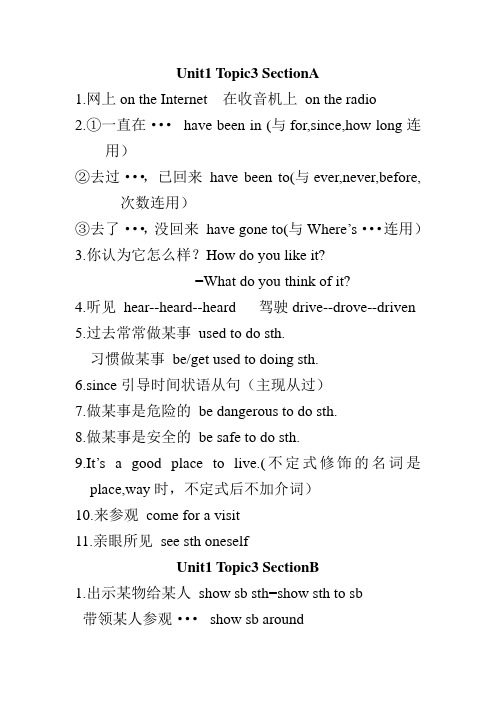
Unit1 Topic3 SectionA1.网上on the Internet 在收音机上on the radio2.①一直在···have been in (与for,since,how long连用)②去过···,已回来have been to(与ever,never,before,次数连用)③去了···,没回来have gone to(与Where’s···连用)3.你认为它怎么样?How do you like it?=What do you think of it?4.听见hear--heard--heard 驾驶drive--drove--driven5.过去常常做某事used to do sth.习惯做某事be/get used to doing sth.6.since引导时间状语从句(主现从过)7.做某事是危险的be dangerous to do sth.8.做某事是安全的be safe to do sth.9.It’s a good place to live.(不定式修饰的名词是place,way时,不定式后不加介词)10.来参观come for a visit11.亲眼所见see sth oneselfUnit1 Topic3 SectionB1.出示某物给某人show sb sth=show sth to sb带领某人参观···show sb around炫耀,卖弄show off 出现,露面show up=turn up 2.无家可归的人homeless people数百的hundreds of重返工作return to work3.过正常的生活live/have a normal life4.设法做成某事(结果一定成功)manage to do sth. 尽力做某事(结果不一定成功)try to do sth.5.一旦once (引导时间状语从句)6.since(引导时间状语从句,主现从过)7.in+名词①在需要时in need ②在困境中in trouble③在危险中in danger ④好健康in good health⑤好心情in a good mood8.①选定某物decide on sth②决定做某事decide to do sth③做决定make a decision9.为某人提供某物offer sb sth=offer sth to sbprovide sb with sth=provide sth for sb10.医疗medical treatment11.为了,以便于so that=in order that (后都跟从句)为了做某事in order to do sth.12.自我感觉良好feel good about oneself13.为···改变change for14.在许多方面in many waysP20:1.for,since,how long 现完,延动,be词组均延动非延动----延动die--be dead leave--be away (from)come--be in join--be in/ be a member ofbuy--have borrow--keepbegin/start--be on close--be closedopen--be open fall ill--be illmarry--be married2.陷入困境get in trouble3.拾起;接某人pick up4.处于救援氛围中in a helpful mood5.帮助某人走出困境help sb outUnit1 Topic3 SectionC1.最···之一one of +the+形容词最高级+可数名词复数最高男生之一one of the tallest boys2.①home (家,家乡,带有感情色彩)the home of ···②house(房屋,指建筑物本身,没有感情色彩)③family(家庭;家人)3.while 然而;当···时候;尽管4.短时期for a short period of time5.从一个地方到另一个地方from one place to another6.other+复名=others7.···的原因the cause of ···的影响the effect of8.无论什么whatever=no matter what9.raise 养育;筹集;(人为的)升起10.养家糊口support family给某人支持give sb support=give support to sb. 11.把···看作···think of···as = regard···as = treat···as12.有某方面的问题have a problem with···Unit1 Topic3 SectionD1.负担afford 不能负担做某事can’t afford to do sth2.截止by①by+过去时间(用于过去完成时)had+过分②by+将来时间(用于一般将来时)3.用这钱with this money4.援助某人做某事aid sb to do sth5.为···做贡献make a contribution to doing sth.6.两者都both···and7.最知名的the best-known8.结果as a result9.没有做某事without doing sth没有··的帮助without the help of10.风险,冒险risk11.八大时态:三“一”:一般现在时,一般过去时,一般将来时两“现”:现在进行时,现在完成时三“过”:过去进行时,过去完成时,过去将来时12.为··付款pay for13.在国内外at home and abroad。
Unit 3 Topic1 SectionA 教案 仁爱版九年级英语上册

九年级上册Unit 3 Topic 1 English is widely spoken throughout the world.Section A【教学构思】一、教材分析:本课属于课标话题人与社会——“语言学习(Language learning)”中语言学习经历(Language learning experiences)项目,主要通过Kangkang,Li Xiang和Wang Junfeng的对话谈论王俊峰即将去迪士尼乐园,他将有一个好机会练习英语。
主要教学活动为1a,2a,2b和3,通过通过Kangkang,Li Xiang和Wang Junfeng的对话谈论王俊峰即将去迪士尼乐园,他将有一个好机会练习英语,学习被动语态am/is/are+past participle的用法以及谈论将来打算和表达愿望的表达法。
在2a和2b练习中,进一步训练被动语态am/is/are+past participle的用法。
在3听力活动中,训练学生通过听力获取细节信息的能力,培养学生“听”的语言能力。
二、设计说明:根据学情和本课的语法及话题,本节课的教学设计将听与说相结合,以1a为载体,立足话题,聚焦语法,通过听说练习内化知识;在语言生成阶段,循序渐进,帮助学生学以致用,并通过同伴合作完成学习任务。
本课在重、难点突破的方法上有所创新,教师在2a练习中巩固被动语态am/is/are+past participle的用法,在2b的活动中应用实践,让学生熟练运用被动语态am/is/are+past participle。
【教学目标】1. 通过听力活动和朗读对话,掌握对话大意和细节,培养“听”与“读”的语言能力;2. 在对话和练习中学习一般现在时被动语态的用法,准确理解一般现在时被动语态的意义并用于表达;3. 通过小组活动,运用本课所学语言知识,发展思维品质、自主学习能力和团队协作意识。
【教学重难点】1. 正确使用被动语态am/is/are+past participle;2. 做汇报展示小组活动成果。
仁爱版英语九年级上册单元知识点汇总第三单元
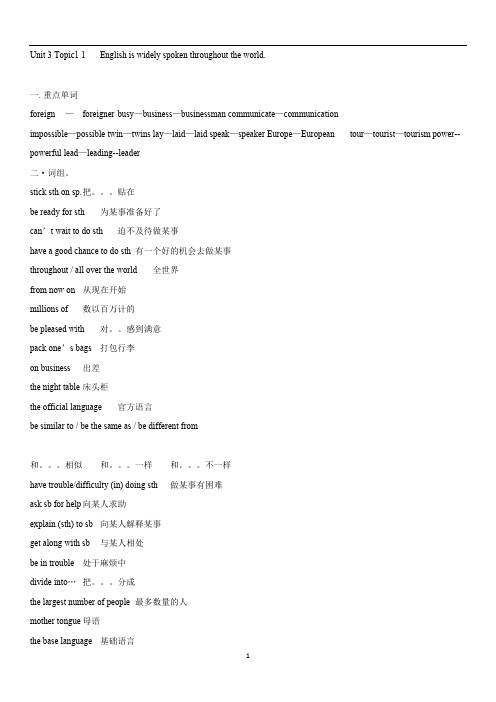
Unit 3 Topic1 1 English is widely spoken throughout the world.一. 重点单词foreign —foreigner busy—business—businessman communicate—communicationimpossible—possible twin—twins lay—laid—laid speak—speaker Europe—European tour—tourist—tourism power--powerful lead—leading--leader二·词组。
stick sth on sp. 把。
贴在be ready for sth 为某事准备好了can’t wait to do sth 迫不及待做某事have a good chance to do sth 有一个好的机会去做某事throughout / all over the world 全世界from now on 从现在开始millions of 数以百万计的be pleased with 对。
感到满意pack one’s bags 打包行李on business 出差the night table 床头柜the official language 官方语言be similar to / be the same as / be different from和。
相似和。
一样和。
不一样have trouble/difficulty (in) doing sth 做某事有困难ask sb for help 向某人求助explain (sth) to sb 向某人解释某事get along with sb 与某人相处be in trouble 处于麻烦中divide into…把。
分成the largest number of people 最多数量的人mother tongue 母语the base language 基础语言international business 国际商业the world’s airlines 国际航空in many different fields of life 在生活的很多不同领域go abroad 出国play an important part in our lives 在我们生活中扮演重要角色a powerful country 一个强大的国家take the leading position in 在某方面处于领先地位encourage sb to do sth 鼓励某人做某事be popular with sb. 受某人的欢迎make great progress in doing sth 在某事上取得巨大的进步require sb to do sth 要求某人做某事in the rest of 在。
仁爱版九年级英语上册Unit3Topic1SectionD教案
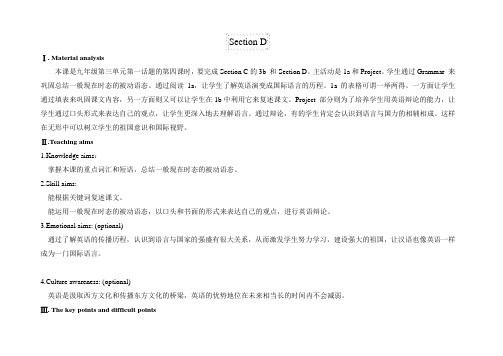
Section DⅠ. Material analysis本课是九年级第三单元第一话题的第四课时,要完成Section C的3b 和Section D。
主活动是1a和Project。
学生通过Grammar 来巩固总结一般现在时态的被动语态。
通过阅读1a,让学生了解英语演变成国际语言的历程。
1a的表格可谓一举两得。
一方面让学生通过填表来巩固课文内容,另一方面则又可以让学生在1b中利用它来复述课文。
Project 部分则为了培养学生用英语辩论的能力,让学生通过口头形式来表达自己的观点,让学生更深入地去理解语言。
通过辩论,有的学生肯定会认识到语言与国力的相辅相成。
这样在无形中可以树立学生的祖国意识和国际视野。
Ⅱ.Teaching aims1.Knowledge aims:掌握本课的重点词汇和短语,总结一般现在时态的被动语态。
2.Skill aims:能根据关键词复述课文。
能运用一般现在时态的被动语态,以口头和书面的形式来表达自己的观点,进行英语辩论。
3.Emotional aims: (optional)通过了解英语的传播历程,认识到语言与国家的强盛有很大关系,从而激发学生努力学习,建设强大的祖国,让汉语也像英语一样成为一门国际语言。
4.Culture awareness: (optional)英语是汲取西方文化和传播东方文化的桥梁,英语的优势地位在未来相当长的时间内不会减弱。
Ⅲ. The key points and difficult points1. Key points:Words and phrases: Britain, powerful, leading, position, take the leading position, as a result, encourage sb.to do sth., be popular with sb., make great progress in doing sth., be required to do sth., be regarded as.Sentences: The American computer and Internet industry have taken the leading position in the world.Many of them have done well in English and have made great progress in speaking it.Grammar: the simple present passive voice.2. Difficult points:理解英国的不同称呼:UK, the United Kingdom, Great Britain。
仁爱英语九年级 Unit 3 Topic 1 说课稿
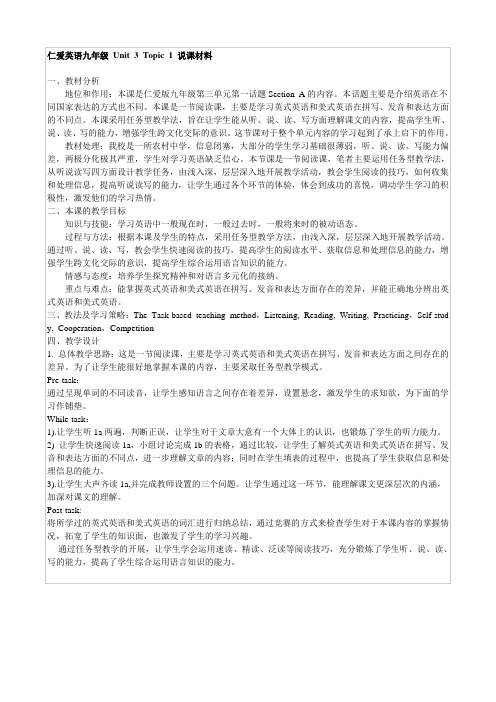
仁爱英语九年级Unit 3 Topic 1 说课材料一、教材分析地位和作用:本课是仁爱版九年级第三单元第一话题Section A的内容。
本话题主要是介绍英语在不同国家表达的方式也不同。
本课是一节阅读课,主要是学习英式英语和美式英语在拼写、发音和表达方面的不同点。
本课采用任务型教学法,旨在让学生能从听、说、读、写方面理解课文的内容,提高学生听、说、读、写的能力,增强学生跨文化交际的意识。
这节课对于整个单元内容的学习起到了承上启下的作用。
教材处理:我校是一所农村中学,信息闭塞,大部分的学生学习基础很薄弱,听、说、读、写能力偏差,两极分化极其严重,学生对学习英语缺乏信心。
本节课是一节阅读课,笔者主要运用任务型教学法,从听说读写四方面设计教学任务,由浅入深,层层深入地开展教学活动,教会学生阅读的技巧,如何收集和处理信息,提高听说读写的能力,让学生通过各个环节的体验,体会到成功的喜悦,调动学生学习的积极性,激发他们的学习热情。
二、本课的教学目标知识与技能:学习英语中一般现在时,一般过去时,一般将来时的被动语态。
过程与方法:根据本课及学生的特点,采用任务型教学方法,由浅入深,层层深入地开展教学活动。
通过听、说、读、写,教会学生快速阅读的技巧,提高学生的阅读水平、获取信息和处理信息的能力,增强学生跨文化交际的意识,提高学生综合运用语言知识的能力。
情感与态度:培养学生探究精神和对语言多元化的接纳。
重点与难点:能掌握英式英语和美式英语在拼写、发音和表达方面存在的差异,并能正确地分辨出英式英语和美式英语。
三、教法及学习策略:The Task-based teaching method,Listening, Reading, Writing, Practicing,Self-stud y, Cooperation,Competition四、教学设计1. 总体教学思路:这是一节阅读课,主要是学习英式英语和美式英语在拼写、发音和表达方面之间存在的差异。
仁爱版英语九年级上册Unit 1 Topic 3. 《The world has changed f

仁爱版英语九年级上册Unit 1 Topic 3. 《The world has changed for the better》教案一. 教材分析本节课是仁爱版英语九年级上册Unit 1 Topic 3的教学内容,主题是“The world has changed for the better”。
通过本节课的学习,学生将了解世界发生的积极变化,提高他们的英语听说读写能力,并培养他们的观察力和思维能力。
二. 学情分析九年级的学生已经具备了一定的英语基础,他们对学习英语有浓厚的兴趣。
但部分学生在口语表达和写作方面还存在一定的困难,需要教师的引导和鼓励。
三. 教学目标1.知识目标:学生能够听懂、会说、会读本节课的主要词汇和句型,了解世界的积极变化。
2.能力目标:学生能够运用所学的词汇和句型进行简单的交流,提高他们的口语表达能力。
3.情感目标:学生能够认识到世界的变化,培养他们的观察力和思维能力。
四. 教学重难点1.重点:学生能够掌握本节课的主要词汇和句型,能够运用所学进行简单的交流。
2.难点:学生能够正确使用一般现在时进行表达,能够写出有关世界变化的短文。
五. 教学方法1.任务型教学法:通过设定各种任务,激发学生的学习兴趣,提高他们的参与度。
2.交际型教学法:通过模拟真实情境,让学生在实际交流中运用所学知识。
3.合作学习法:鼓励学生相互合作,共同完成学习任务。
六. 教学准备1.教师准备:准备好本节课的教学PPT,准备好相关的教学材料。
2.学生准备:学生提前预习本节课的内容,了解世界的一些变化。
七. 教学过程1.导入(5分钟)教师通过向学生展示一些世界的变化图片,如科技的发展、环境的改善等,引导学生谈论世界的变化。
2.呈现(10分钟)教师通过PPT展示本节课的主要词汇和句型,如“The world has changed forthe better.”、“There are more people using computers now.”等,同时进行翻译和解释。
- 1、下载文档前请自行甄别文档内容的完整性,平台不提供额外的编辑、内容补充、找答案等附加服务。
- 2、"仅部分预览"的文档,不可在线预览部分如存在完整性等问题,可反馈申请退款(可完整预览的文档不适用该条件!)。
- 3、如文档侵犯您的权益,请联系客服反馈,我们会尽快为您处理(人工客服工作时间:9:00-18:30)。
Language points
1. I will be able to see more cartoon characters.我将
可以看到更多的卡通人物。
will be able to do sth. 将要能干某事 表能干某事,可以用can do, 但情态动词can 只有一般现在时,和一般过 去式could do, 表将有能力干某事只能用will be able to do. 如果我多练习,我将能参加中国好声音。 will be able to take part in the Voice of China. If I practice more, I _______________________ 2. I can’t wait to fly there.我都等不及飞到那里了。 can’t wait to do sth. 迫不及待做某事 暑假到了,我迫不及待要回到农村看望我的祖父母. can’t wait to return to the Summer is coming, and I ___________________ countryside to see my grandparents.
Section A
Mickey Mouse
Donald Duck
n.漫画
cartoon characters
n.(书、剧本、电 影等中的 )人物, 角色;(汉)字, 字体;品格
Do you know the story of Mickey 3 Listen to the passage and mark Mouse? T (True) or F (False).
Unit 3 English Around the World Topic 1 English is widely spoken throughout the world.
Unit 3 English Around the World Topic 1 English is widely spoken throughout the world.
Group Activity: A dialog show Situation: Suppose you were Jim from Canada, and you have got a chance to fly to China to visit the Great Wall.
Match the following phrases with proper Chinese meanings. stick it on the wall will be able to millions of all over/throughout the world be ready for have a good chance to do can’t wait to do be spoken as the main language from now on 为… 做准备 有做某事的好机会 数以百万的 将要能做某事 被当做主要语言 粘贴在墙上 迫不及待要做某事 从今往后 遍及全世界
Before listening, try to guess the pronunciations and meanings of the new words in the statements.
( T ) 1.Walt Disney was a great film-maker as well as an artist. ( T ) 2.Walt used to sit in the family garage and draw pictures. ( T ) 3.One day, a mouse came and played on the floor of the garage. ( F ) 4.When he first met the mouse,Walt was afraid. ( T ) 5.At last, he was pleased with one of his pictures of the mouse. He called it Mickey Mouse. 对… 满意 My mother is pleased with my good results.
ቤተ መጻሕፍቲ ባይዱ
The story of Mickey Mouse
Walt Disney:
film-maker
The story happened in a garage.
n.停车房;车库
Mickey Mouse is enjoyed by millions of people throughout the world.
prep.遍及;贯穿
She comes from Disneyland.
1b Listen to 1a and choose the correct answers.
( C ) 1. Who is going to Disneyland? A. Wang Junfeng. B. Wang Junfeng’s parents. C. Wang Junfeng and his parents. ( B ) 2. What language is widely used throughout the world now? A. Chinese. A. English. C. A poster. B. English. C. French. ( B ) 3. What are the boys mainly talking about? B. Visiting Disneyland.
1c Read1a again and fill in the blanks.
Wang Junfeng and his parents will go to Disneyland in America next week. Disneyland is enjoyed by millions of people throughout ____________ the world. He will have a good chance to practice English because English is important ____________ is spoken for communication there. English _________ is as the main language in America. It _____ also used widely ______ around the world.
